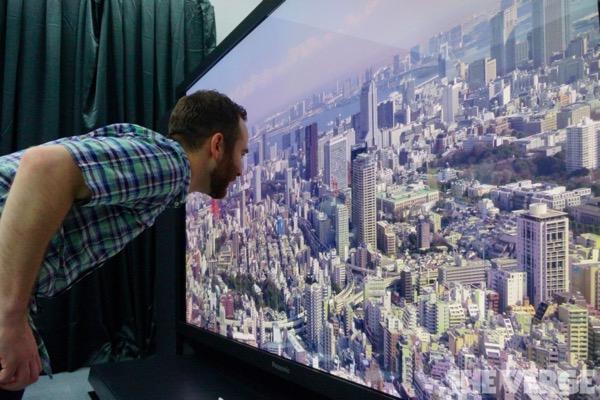8K in LA

In the last week in June a well-attended, two-day seminar on near-future UHDTV display technologies took place in Hollywood, CA. Conducted by Insight Media, a company that both consults with companies in the video display industry and conducts media-related tech conferences, and sponsored by Samsung, the conference dove heavily into subjects such as 8K, Quantum Dots, and micro LEDs.
I’ll cover Quantum Dots and micro LEDs in a future blog. But like it or not, with the paying public only just getting a handle on 4K, 8K is now a hot topic in the industry. But there are challenges to be overcome before you’ll see 8K sets at your local Best Buy. Skeptics point to its need of four times the data storage of 4K, the lack of a clear standard or business model, the expense, and whether or not we really need such high resolution given the inherent limitations of human visual perception combined with the typical domestic environment. Most viewers sit too far from their TVs to fully appreciate the resolution of 4K, much less 8K. Will we find that to fully appreciate 8K’s benefits we’ll have to watch our new 8K TVs like the fellow in the above photo?
And given the current dominance of streaming video, 8k would require new compression algorithms to make it squeeze through an increasingly crowded Internet pipelinenot to mention a redesign of the UHD Blu-ray format. Given the perceived tailing-off of packaged media from its former prominance, is the industry ready to make the investments needed to perfect both forms of content delivery? And as for broadcast, the new ATSC 3.0 system was designed for 4K and is barely getting off the ground. Not only is it not yet available in any current 4K set (no surprise given the absence of any 4K broadcasts), as it stands it isn’t compatible with 8K. In short, the technology is far outpacing the available infrastructure.
In addition, 8K resolution from a conventional UHDTV, everything else being equal, will result in some loss of peak brightness capability. And given that even with today’s 4K UltraHD technology it’s HDR and not resolution that makes the biggest impression on the viewer, will this slow the possible transition to 8K?
But the TV industry is built on selling numbers. Given that the TV market is a low margin, cutthroat business, TV makers have to have something new to excite the public every five years or so. We’re already half way through that period with 4K, and 8K sounds so much better than 4K, regardless of any possible real benefits. Even today much of what is labelled 4K is simply upconverted from 2K sources.
If much of the above sounds downbeat, the overall tone of the 8K presentations was anything but. There are technical challenges to be sure, but also plenty of brain-power dedicated to solving them. There are even plans for limited 8K broadcasting of major sporting events, such as the 2020 Olympics in Tokyo. 8K cameras are currently available, and Japan’s NHK is starting a dedicated 8K channel (in Japan 8K is called Super Hi-Vision). But NHK began broadcasting 1080i HD in the 1980s, long before it became mainstream. Then, as now for 8K, it took years before these technologies were widely available to the public.
But there’s perhaps a more important use for 8K that won’t involve massive upgrades on the transmitting and receiving sides: 8K capture. There are numerous possible benefits to capturing material in 8K and downconverting it to 4k for streaming, broadcasting, and disc-based playback. These include a lower noise floor, better dynamic range mapping, depth of field from new lenses, and re-framing. In the latter, a cinematographer can shoot wider than needed and in post-production re-frame or even magnify the shot as the director requires without degrading the visible resolution.
8K can also be significant in the medical industry, where the result is viewed close to the screen and enhanced resolution can be life-saving. But for this to become affordable, even in an industry where affordability isn’t a high priority, it will need to piggyback on the economies of scale possible in the consumer television market.
Make no mistake: 8K is coming. The only question is when. Two years? Five years? Sooner perhaps than later? But I wouldn’t hold my breath and pass on that new 4K set you want today in anticipation of an imminent 8K launch. Life’s too short. I once had an uncle who put off buying a new color TV in the CRT era until they were “perfected.” He may still be waiting for that in the big home theater in the sky.





























































